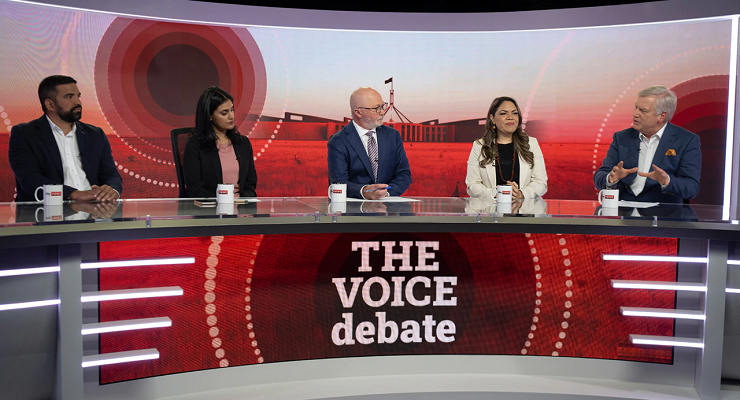
Advocates for the Voice to Parliament and the adoption of the Uluru Statement to the Heart know how hard it is to get Australians to vote for constitutional change. But Dean Parkin, a director of From The Heart, is embracing the challenge.
Parkin, who is from the Quandamooka peoples of Minjerribah, is under no illusions about the task that lies ahead for advocates for a constitutionally recognised Voice to Parliament, given the last successful attempt to change the constitution was in 1977.
Part of the task at hand is fronting and tackling the issues in panel discussions and debates in what would sometimes be perceived as hostile territory. Parkin and Dr Shireen Morris, a fellow pro-Voice panellist and constitutional expert, were a part of a recent debate hosted by Sky News on the Voice that also featured prominent opponents of the proposal, Indigenous Senator Jacinta Price and commentator Andrew Bolt.
Contested debates might appear more regularly in Parkin’s diary as Australia heads closer towards a referendum on the issue, but they are not in his view representative of the mood he has felt in the community.
“I will say that type of debate is not typical of the conversations we have been having over the past five years or more,” Parkin said.
“Generally speaking, there is a lot more intuitive openness. There is curiosity. Yes, there are some people that have concerns largely because they haven’t been engaged previously, they don’t know a lot about what this is about, and they are seeking a little bit more clarity and a little bit more information.”
Parkin said that people are sympathetic to the idea when it is explained to them that this is about recognising Aboriginal and Torres Strait Islanders as the original inhabitants of the country.
“People intuitively understand that things can be better in Aboriginal and Torres Strait Islander communities than they currently are,” he said.
“They are coming at this from a position of [wanting] to be part of a movement that contributes to a practical impact on the lives of Aboriginal and Torres Strait Islander people and be involved in this great big moment of symbolism for the country of recognising Indigenous people after 240 to 250 years of the modern Australian nation.”
There are disagreements from within Indigenous communities themselves on whether the Voice to Parliament is the best way to deal with the challenges they face, with prominent critics such as Price, Warren Mundine and Anthony Dillon making their concerns known at conferences and the media.
How does Parkin cope with opposition to the idea of the Voice?
“The starting point is understanding that our community is just like any other community,” Parkin said.
“We have to get away from this idea that difference of opinion among Indigenous people immediately represents division and conflict. That’s what happens far too often.”
He said there is a need to create a space where respectful conversations can take place on issues and concerns raised by people regarding the Voice to Parliament.
“We cannot be talking about things as big as Voice to Parliament, as big as Indigenous constitutional recognition and referendums and so forth, and expect there is no difference of opinion,” Parkin said.
“That difference of opinion is actually healthy. I see it as a sign of healthy debate and a sign that this is being treated as the serious issue that it is.”








if the Bolter is against it, it must be a good thing
Yes, that’s generally a reliable measure of any political decision or social/cultural behavior. However, it is nice to see someone like Parkin taking a stance that’s based on trying to understand the opposition’s point of view. Bolt et al could learn from that.
The sooner the referendum the better. Strike while the iron is hot. Those who don’t know or care by now never will.
Great to hear from Dean Parkin in this piece. Whether you agree with him or not, he is always excellent value.
Dont forget that the dissenters named are also high profile right wingers. They dont actually have a moral or intellectual view on this. They are doing what their right wing controllers are telling them to do. Mindlessly oppose by any means whatever.
I am against it, because it is a Constitutional change. I don’t see how the founding and defining document of a country can provide privilege to one group over another. The initial version of Constitution did that in favour of a ‘white Australia’, and I don’t see any reason to go back there.
More than that, how do we define Aboriginality or “first nation-ness”? All I see here is endless arguments which, by accident, take us back to the nineteenth century, if not European eugenics. Shall ‘quadroons’ be eligible to be a ‘voice’?
The more one thinks about, the more preposterous the idea becomes, if not counter-productive. Endless court cases, endless arguments.
No, this cannot pass. A statutory authority I could handle. A change to the Constitution when we can’t even agree what an ‘aboriginal’ is? No way. It’s my country, too.
(Joe is a proud Carrum Downs man)
Here is the definition the federal government currently uses: “The Australian Government defines Indigenous Australians as people who: are of Aboriginal or Torres Strait Islander descent; identify as being of Aboriginal or Torres Strait Islander origin; and are accepted as such in the communities in which they live or have lived.”
https://www.aihw.gov.au/reports/australias-welfare/profile-of-indigenous-australians#:~:text=The%20Australian%20Government%20defines%20Indigenous,they%20live%20or%20have%20lived.
“I don’t see how the founding and defining document of a country can provide privilege to one group over another”
The Voice doesn’t do that, as I understand it. It would be an advisory body to parliament with no power or authority over parliament whatsoever and it would be advising on matters that affect First Nations people specifically- things like the Intervention and the Indue card. It’s no more remarkable an expectation than people with disability having input into their own NDIS plans. The only remarkable part is the need for Constitutional change to achieve it so late in the day.